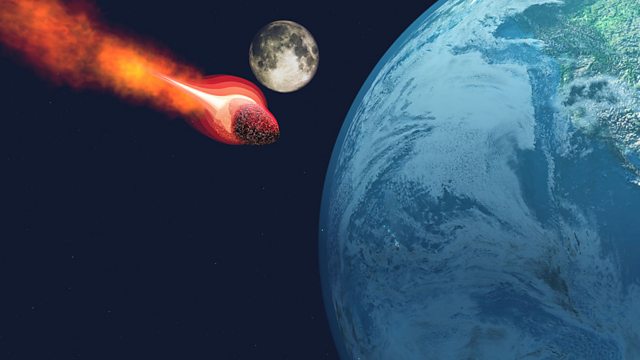Catastrophism
Melvyn Bragg and his guests discuss Catastrophism, the idea that the geological record was shaped by a series of natural disasters early in the Earth's history.
Melvyn Bragg and his guests discuss Catastrophism, the idea that natural disasters have had a significant influence in moulding the Earth's geological features. In 1822 William Buckland, the first reader of Geology at the University of Oxford, published his famous Reliquae Diluvianae, in which he ascribed most of the fossil record to the effects of Noah's flood. Charles Lyell in his Principles of Geology challenged these writings, arguing that geological change was slow and gradual, and that the processes responsible could still be seen at work today - a school of thought known as Uniformitarianism. But in the 1970s the idea that natural catastrophes were a major factor in the Earth's geology was revived and given new respectability by the discovery of evidence of a gigantic asteroid impact 65 million years ago, believed by many to have resulted in the extinction of the dinosaurs.
With:
Andrew Scott
Leverhulme Emeritus Fellow in the Department of Earth Sciences at Royal Holloway, University of London
Jan Zalasiewicz
Senior Lecturer in Geology at the University of Leicester
Leucha Veneer
Visiting Scholar at the Faculty of Life Sciences at the University of Manchester
Producer: Thomas Morris.
Last on
More episodes
Previous
Next
LINKS AND FURTHER READING
Μύ
Μύ
Μύ
Μύ
Μύ
READING LIST:
Μύ
Derek Ager, The Nature of the Stratigraphical Record (MacMillan, 1973)
Μύ
Derek Ager, The New Catastrophism: The Importance of the Rare Event in Geological History (Cambridge University Press, 1993)
Μύ
D.J. Blundell and A.C. Scott (eds.), Lyell: The Past is the Key to the Present (Geological Society, 1998)
Μύ
Peter J. Bowler, The Fontana History of the Environmental Sciences (Fontana, 1992)
Μύ
William Buckland, Reliquiae Diluvianae; or, Observations on the Organic Remains Contained in Caves, Fissures, and Diluvial Gravel, and on other Geological Phenomena, Attesting the Action of an Universal Deluge (J. Murray, 1823)
Μύ
John Imbrie and Katherine Palmer Imbrie, Ice Ages: Solving the Mystery (Harvard University Press, 1986)
Μύ
M. Kölbl-Ebert (ed.), Geology and Religion: A History of Harmony and Hostility (Geological Society, 2009)
Μύ
Charles Lyell, Principles of Geology (Penguin, 1997)
Μύ
Adrienne Mayor, The First Fossil Hunters: Dinosaurs, Mammoths and Myth in Greek and Roman Times (Princeton University Press, 2011)
Μύ
Martin Rudwick, The Meaning of Fossils: Episodes in the History of Palaeontology (University of Chicago Press, 1985)
Μύ
Martin Rudwick, Bursting the Limits of Time: The Reconstruction of Geohistory in the Age of Revolution (University of Chicago Press, 2005)
Μύ
D.G. Smith, R.J. Bailey, P.M. Burgess, A.J. Fraser (eds.), Strata and Time: Probing the Gaps in Our Understanding (Geological Society, 2014)
Μύ
Credits
| Role | Contributor |
|---|---|
| Presenter | Melvyn Bragg |
| Interviewed Guest | Andrew Scott |
| Interviewed Guest | Jan Zalasiewicz |
| Interviewed Guest | Leucha Veneer |
| Producer | Thomas Morris |
Broadcasts
- Thu 30 Jan 2014 09:00Βι¶ΉΤΌΕΔ Radio 4
- Thu 30 Jan 2014 21:30Βι¶ΉΤΌΕΔ Radio 4
Featured in...
![]()
Science—In Our Time
Scientific principles, theory, and the role of key figures in the advancement of science.
In Our Time podcasts
Download programmes from the huge In Our Time archive.
The In Our Time Listeners' Top 10
If you’re new to In Our Time, this is a good place to start.
Arts and Ideas podcast
Download the best of Radio 3's Free Thinking programme.
Podcast
-
![]()
In Our Time
Melvyn Bragg and guests discuss the ideas, people and events that have shaped our world.



